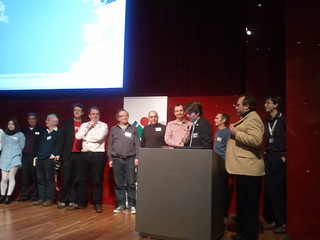By Andreas Kolbe

Jimmy Wales and the Wikimedia UK team, circa 2010
The publication on 7 February 2013 of an independent report on Wikimedia UK governance, commissioned jointly by Wikimedia Foundation and Wikimedia UK, was covered the following day by Civil Society Media’s Governance magazine (“Wikimedia UK trustees have been ‘too involved’ to effectively govern charity”), aimed at charity trustees, chief executives and company secretaries, and by Third Sector (“Review urges major overhaul of governance at Wikimedia UK”), a UK magazine specialising on the voluntary and non-profit sector.
Background
The review, performed by management consultancy Compass Partnership, was paid for by the Wikimedia Foundation. It was commissioned in October of last year, in the wake of media controversy and community discussions around the Monmouthpedia and Gibraltarpedia outreach projects. A key part of the dispute, Governance said, was—
“ an intellectual property dispute over QRpedia, a mobile web-based system using QR codes to deliver Wikipedia articles, that was developed by former chairman Roger Bamkin (who resigned as a trustee in 2012) and contributor Terence Eden. ”
Bamkin had undertaken a paid consultancy for the Monmouthpedia project, which involved the use of QR codes, resulting in a conflict of interest that according to report authors Compass Partnership was not drawn to the attention of legal staff at the Wikimedia Foundation who dealt with trademark applications. Bamkin then also charged for consultancy fees in relation to Gibraltarpedia, leading to a further conflict of interest which eventually resulted in his resignation from the Wikimedia UK board in September 2012.
As stated by Jay Walsh, Senior Director of Communications, on the Wikimedia Foundation blog,
“ The Foundation and Wikimedia UK saw the potentially damaging effect of these matters and we ordered this review and report. We both
…continue reading Wikimedia UK governance review finds significant failings
